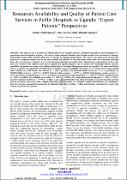Resources availability and quality of patient care services in public hospitals in Uganda: “expert patients” perspectives

View/
Date
2017-04Author
Kaziba Mpaata, Abdul
Okiria, John Charles
Lubogoyi, Bumali
Metadata
Show full item recordAbstract
This study set out to examine the relationship between Hospital resources availability and patient care management in a
government referral hospital in Uganda. It focused on Iganga Regional Hospital which handles patients from the districts of Mayuge,Namutumba, Luuka, Kaliro, Buyende that were curved from the original Iganga district. The research was based on the premise that resources in a regional hospital must be not only available but sufficient to serve the health needs of the local community including those who seek emergency treatment. A survey questionnaire approach was used for data collection from actual patients or those who take care of them in the different units of the hospital. The specific objective was to examine the relationship between resource availability and patient care using eleven different dimensions to investigate this phenomenon in the hospital. The study revealed that there is a positive and significant correlation between hospital resources availability and patient care in all the eleven aspects studied which include; (1) Child health care services [r = .562**, p<0.0001]; (2) Maternal health services [r = .571**, p<0.0001]; (3) STI/HIV/AIDS services [r = .415**, p < 0.0001]; (4) Tuberculosis services [r = .437**, p < 0.0001]; (5) Outpatient curative services [r = .607**, p<0.0001]; (6) Supervision [r = .471**, p<0.0001]; (7) Equipment, drugs and facilities [r = .559**, p<0.0001]; (8) Infrastructure [r = .426**, p<0.0001]; (9) Availability of specialists [r = .446** p < 0.0001]; (10) Staff training and development [r = .296*, p < 0.012]; and (11) Sanitation facilities [r = .471**, p < 0.0001. It was concluded therefore that referral hospitals in Uganda should be providedwith the necessary resources in order to significantly deliver effective patient care. Similarly, hospital administrators are challenged tohave the necessary managerial competencies to effectively lead with a realistic, credible and attractive commitment to ensure that services are delivered as expected.
